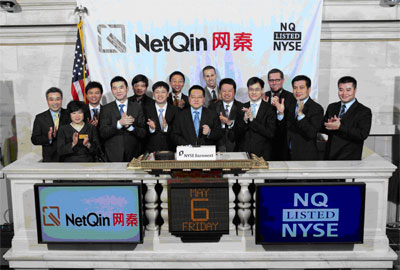NQ Mobile faces severe credibility issue
 0 Comment(s)
0 Comment(s) Print
Print E-mail Shanghai Daily, November 1, 2013
E-mail Shanghai Daily, November 1, 2013
|
|
|
NQ Mobile went listed on NASDAQ in May 2011. [File photo] |
A recent report by a firm famed for short selling helped slash the market capitalization of Nasdaq-listed NQ Mobile Inc nearly in half and renewed concerns about transparency problems dogging Chinese companies listing in the United States.
Beijing-based NQ Mobile, one of China's top mobile security firms, lost 47 percent of its value after Muddy Waters LLC published a report last Friday claiming the company inflated revenue and lied about its cash balance.
Carson Block, founder of Muddy Waters, called the company "a massive fraud and worthless."
"We believe it is a zero," Block wrote in his report. "At least 72 percent of NQ's purported 2012 China security revenue is fictitious."
Block said NQ Mobile would end up like Sino-Forest Corp, the Chinese tree-planting company listed in Canada that was forced to file for bankruptcy protection last year after a damning Muddy Waters report claimed it exaggerated its revenues.
Shares of NQ Mobile slumped up to 60 percent in two days, even after the company strenuously denied the allegations.
The company held a two-hour conference call with analysts and shareholders, and published a 97-page "clarifying" document. It also announced a share buyback and made public details of a cash account with Standard Chartered Bank. The document included data on NQ Mobile's cash reserves, income and user base.
Whether NQ Mobile can successfully restore its reputation and regain lost market value remains unknown, but the issue sends another warning to Chinese companies about the importance of transparency and credibility if they want to list overseas.
Many industry observers worry the NQ Mobile case will adversely impact Chinese companies seeking to raise money in US capital markets, which are set to resume after more than a one-year hiatus due to economic uncertainties.
This case tells those firms, including online travel group Qunar and Internet portal 58.com, to pay more attention to transparency and honest disclosure.
A US listing may be easier than an IPO in China's domestic markets, but that ease of access comes with more strict conditions and requirements.
Both 58.com, which allows users to sell second-hand products and rent rooms, and Qunar, the Chinese version of Expedia, will need to reveal thorough information for any IPO in the US. Their services relate to millions of people.
In NQ Mobile's case, one of the major accusations involves its cash position, classified as level 2 assets, according to auditing firm PricewaterhouseCooper. Level 2 assets are those that don't have an actively traded market and thus have to be valued on a market-to-market basis.
Muddy Waters also alleged NQ Mobile's market share in China was only 1.5 percent, not the 55 percent as claimed.
Even in IT media circles, few of my friends have ever used NQ Mobile products, though the name was vaguely familiar because of its Nasdaq listing.
Lin Yu, co-chief executive of NQ Mobile, said the company's revenue may reach US$200 million this year, more than its previous estimate of US$188 million. By 2015, the company predicts income of US$500 million.
No one knows what to make of those figures now.
ZTE Corp reportedly is ending its links with NQ Mobile and Apple Inc has suspended downloads of NQ Mobile applications.
The crisis for NQ Mobile comes as the company was planning to diversify into mobile advertising, music and games.
Muddy Waters may have its detractors, but there's no doubt it plays a role in holding companies to account.
Muddy Waters began publishing research in June 2010. Block gained fame for his short-selling calls in Asia after regulators halted trading in four of the first five companies he took to task, including New Oriental Education and Sino-Forest.
Critical reports by Muddy Waters drove down the shares of eight companies by an average of about 77 percent, according to Bloomberg News.
But astute companies, like Focus Media and Qihoo 360, learned their lessons and were able to rebuild share prices after being targeted by firms like Muddy Waters. They simply started playing by the strict rules set down in Western markets and became more transparent.







Go to Forum >>0 Comment(s)